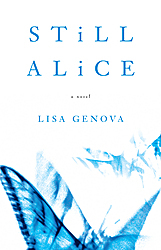Alice Howland is proud of the life she worked so hard to build. At fifty years old, she’s a cognitive psychology professor at Harvard and a world-renowned expert in linguistics with a successful husband and three grown children. When she becomes increasingly disoriented and forgetful, a tragic diagnosis changes her life--and her relationship with her family and the world--forever.
At once beautiful and terrifying, Still Alice is a moving and vivid depiction of life with early-onset Alzheimer’s disease that is as compelling as A Beautiful Mind and as unforgettable as Judith Guest's Ordinary People.
At once beautiful and terrifying, Still Alice is a moving and vivid depiction of life with early-onset Alzheimer’s disease that is as compelling as A Beautiful Mind and as unforgettable as Judith Guest's Ordinary People.
~~~~~~~~~~~~~~~~~~~~~~~~~~~~~~
Alzheimer's is a terrifying disease. The idea of losing everything that makes you, you, is just so frightening. To forget your spouse, your children, memories, both good and bad, to me seems like the worst kind of torture. I can't imagine what that must be like or how devastating it must be to the loved ones around them.
To be honest, this novel wasn't what I was expecting. In fact, I didn't realize it was a work of fiction until I started reading it. For some reason, I had it in my head that it was based on a true story. In a way, I guess it is. It is certainly realistic fiction. I am sure that Alice's story is reminiscent of many sufferers of Alzheimer's disease.
I think the novel did a fine job of depicting the disease, especially it's progression. It was heartbreaking to watch this strong, intelligent woman, lose everything - her career, her independence, everything that made her life what it was. It was hard to watch how the diagnosis affected her husband and her children. It was hard to see how drastically her life changed in such a short span of time. It wasn't all bad though. There were sweet moments between Alice and her husband and children. There were moments of triumph when Alice successfully forms a support group for people with Alzheimer's and when she speaks successfully at a medical conference about what it's like to have the disease. But the truth was never far away. There is no cure, and the inevitable will always happen.
Overall, this wasn't a bad read. I can't call it spectacular, but I did enjoy it. It's a quick read and only took me a few days to finish. I liked the story well enough that I am interested in checking out the film adaptation. I am curious to see how the story translated to film. A three star read for me.

No comments:
Post a Comment